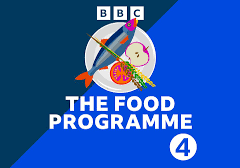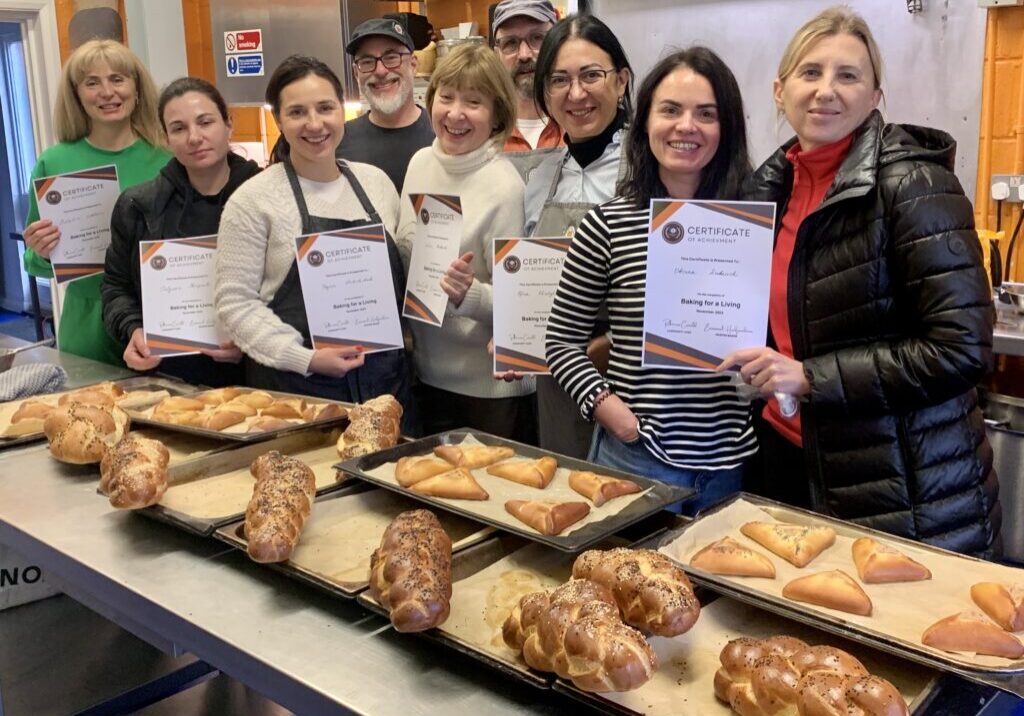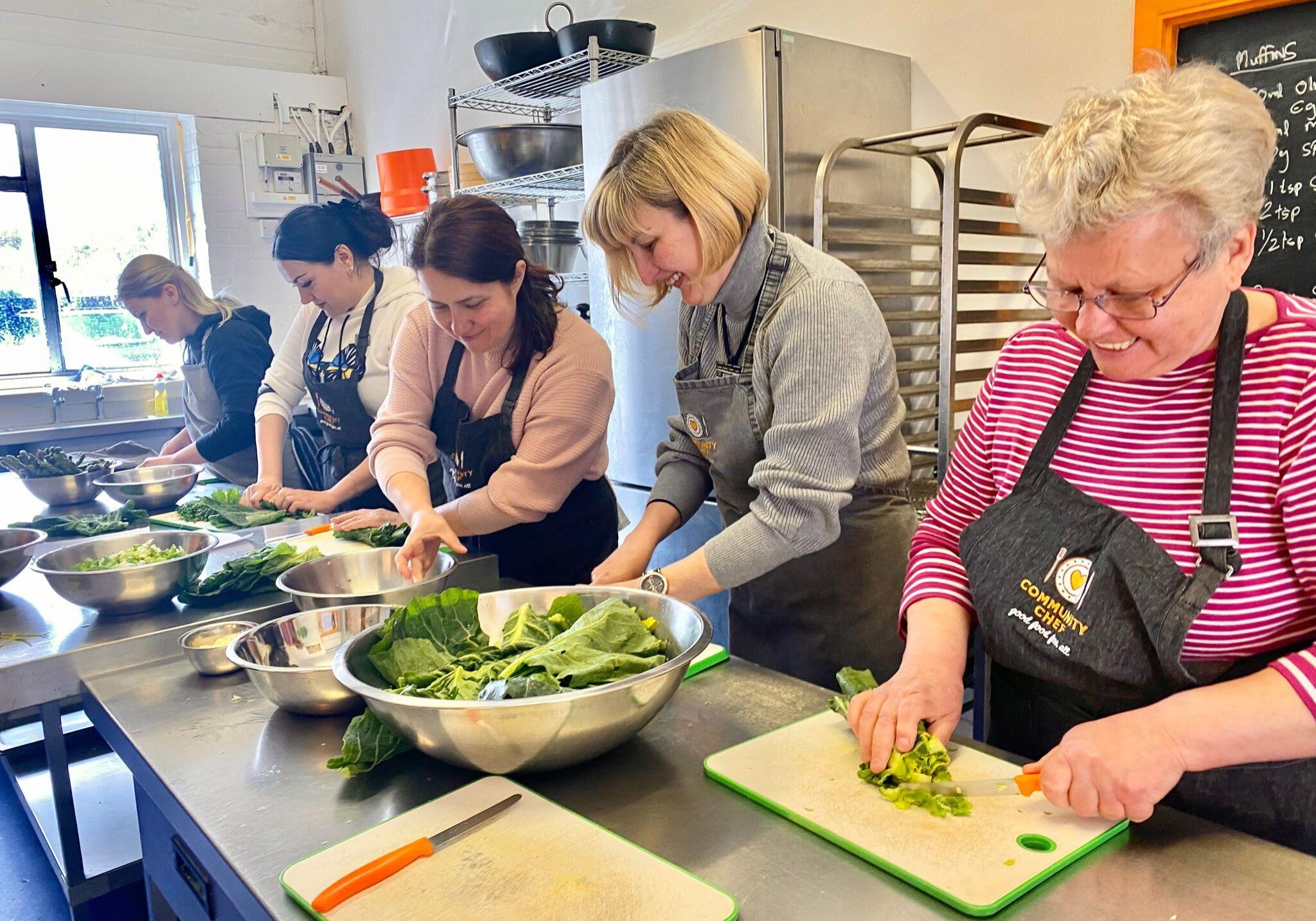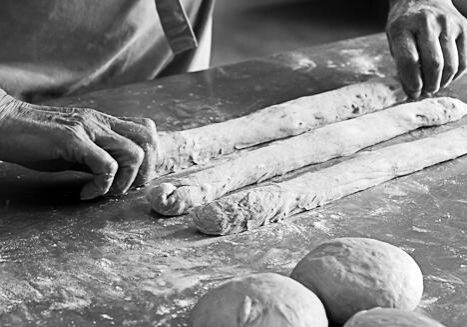Kitchen Fundamentals are a series of online cookery workshops run by Community Chef. The aim has been to help new and improver cooks to learn fundamental kitchen and cookery techniques from professional chefs and bakers. Here are some of the recipes we have been teaching:
Montaditos
A Spanish inspired open sandwich of crusty bread topped with seared courgettes, salsa verde and toasted almonds. Courgettes are a versatile and beautifully tender vegetable with a fresh, delicate flavour. They are also a good vehicle for carrying strong punchy flavours. They are easy to grow and therefore very cheap in season, which is usually June to September. The dish works best if the courgettes are cooked in batches and the sandwiches assembled just before serving. Serves 4
1 large baguette or crusty bread of choice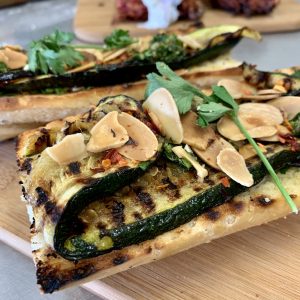
3 medium size courgettes
2 tbsp olive or sunflower oil
2 cloves of garlic, finely chopped
Juice of ½ lemon
Salt and pepper
1 small bunch parsley
2 tsp capers
1 clove garlic, crushed
2 tbsp olive oil
Juice of ½ lemon
½ tsp chilli flakes
30g flaked almonds, lightly toasted in a dry pan
Method:
- Start with the salsa verde – finely chop the parsley together with the capers and garlic. Mix this with a the olive oil and lemon juice and season to taste
- Slice the courgettes lengthways or on the diagonal into long strips. About 5mm thick is ideal as you want them to hold their shape. Place into a shallow dish and dress with the oil and a good amount of salt and pepper.
- Heat a large non-stick frying pan or griddle pan over a medium-high heat. Fry the courgette strips until they brown at the edges then turn and cook them on the other side.
- When the other side starts to char, add the garlic and cook for about 30 seconds, then turn the heat right up and pour over the lemon juice. Cook this briefly allowing the lemon juice to sear the outside of the courgettes.
- To assemble – Slice the bread into long slices on the diagonal. Use the bread like this or brush with a little olive oil and lightly toast under a grill. Place a slice or two of the seared courgette onto the bread. Dress with the salsa verde and top with the toasted almonds and chilli flakes.
Latkes
A latke is a European, Jewish potato pancake. They can be made with most root vegetables, but potatoes are generally included. They are traditionally shallow fried, you can also roast them for a no fuss and less oily dish. I like to serve mine with sauerkraut and sour cream, quark or thick yoghurt laced with chopped dill. Makes 16 small latkes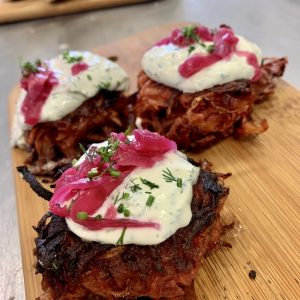
750g waxy potatoes, grated
1 carrot, grated
1 beetroot, grated
3 spring onions, very finely chopped or 1 small red onion, grated
3 tbsp white flour
2 free-range egg, beaten
Salt and freshly ground pepper
Olive or sunflower oil
Method:
- Grate the potatoes, carrot and beetroot. Gather this together in a clean cloth and squeeze out as much liquid as you can.
- Add the onion, egg and flour to the grated vegetables and season with salt and pepper. The mixture should feel a little sticky and hold together if you scrunch some up in your hand.
- If roasting – If roasting, preheat the oven to 180c or 350f. Divide the mixture into 12 – 16 portions and if fat averse, put onto a lightly oiled baking tray. Brush the tops lightly with oil and roast for 25 minutes or until golden. If you prefer a really crispy latke, preheat the pan with 2mm of oil until smoking hot then add the mixture and roast as above.
- If frying – Heat enough sunflower oil to ¼ fill a large frying pan until moderately hot and then place heaped tablespoons of the mixture gently into the pan. Fry for about five minutes on each side, turning over when the edges turn golden-brown. Do this in several batches rather than overcrowd the pan.
- Remove the latkes from the pan and drain on brown paper or kitchen paper.
Kale, walnut and feta pide
Pide is a Turkish pizza. They are generally shaped like a boat and filled with a number of toppings. This one is topped with feta, walnuts and kale. Makes 4 pide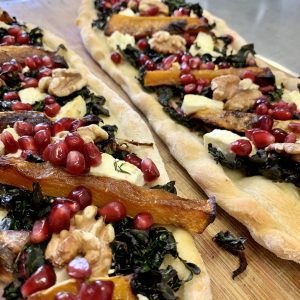
For the dough
500g strong white flour
7g or 1 heaped tsp salt
5g or 1 heaped tsp quick yeast
325g warm water
- Mix the flour, yeast and salt with the warm water to form a rough dough and then turn it out onto a lightly floured surface and knead with vigour until the dough is smooth and glutenous.
- Place back into an oiled bowl, cover with a bag or cling film and place in a warm place to ferment for 2 to 3 hours. It should more than double in size during this time.
- Turn this out onto a lightly floured surface and gently knead again.
- Divide this into 4 pieces and gather each piece into a ball. Place these onto a tray and dust with flour, cover with a bag or plastic and allow them to relax and prove for another hour before preparing the pide.
For the topping
400g kale, tough stalks removed then washed and shredded
1 red onion, finely sliced
Juice of ½ lemon
10g fresh dill or mint or some of each, chopped
200g feta cheese, cubed
200g, walnuts, gently roasted
1 small pomegranate, seeds removed
Olive oil
- Prepare the kale and mix together with the sliced onions, the juice of half a lemon, a little olive oil and some salt and pepper. Mix and massage the kale a little to break down the structure.
- Mix in the chopped dill or mint and the cubed kale.
- Roast the walnuts and prepare the pomegranate.
To assemble and bake
- Preheat the oven to its hottest setting and line two large baking trays with baking parchment.
- Roll out each ball of dough into a long semi-circle about 35 cm x 15 cm. Fold over the edges all round and crimp them down to make a boat like shape and place onto your baking trays. Repeat with the remaining dough balls, aiming for two Pide on each tray. Divide the kale mixture into 4 equal portions and top the pide with this.
- Bake straight away for around 7 minutes, the dough should be set and starting to crisp up on the bottom. If it’s not fully cooked, give it a bit more time. The overall timing really depends on how hot the oven gets. Take out of the oven and scatter the walnuts and pomegranate seeds on top. Drizzle with a little olive oil and serve hot.

